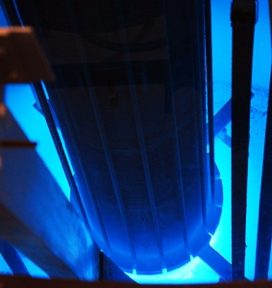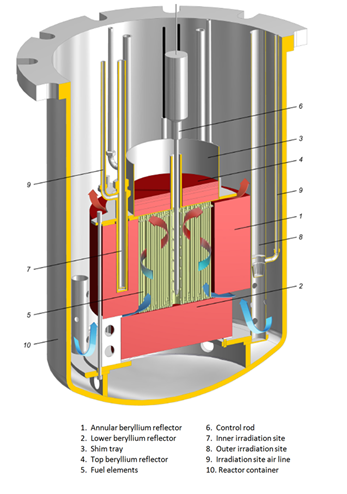

The Jamaican SLOWPOKE-2 research reactor (JM-1) is a pool type reactor, designed by the Atomic Energy of Canada Ltd (AECL). It is fueled by approximately 6 kg of uranium enriched to 19.86% 235U and has a nominal thermal power rating of 20 kW when operating at full power. JM-1 was commissioned in 1984 and is located at the International Centre for Environmental and Nuclear Sciences(ICENS). The reactor is owned and operated by the University of the West Indies, Mona Campus and is primarily used for neutron activation analysis of trace elements in studies related to health, the environment and agriculture as well as in education and training. The reactor staff consists of 7 persons including the Reactor Manager, the head of the Head of the Nuclear Analytical Laboratory, The Radiation Safety and Security Officer, the Quality Manager and three other reactor operators.
 Technical Features
Technical Features
Products and Services:
The JM-1 facility’s focus is research primarily in studies related to the environment, agriculture and health. The main analytical technique in these studies is neutron activation analysis but other complimentary analytical techniques such as x-ray fluorescence (XRF) spectrometry, atomic absorption spectrometry (AAS), inductively coupled plasma-optical emissions spectrometry (ICP-OES) and anodic stripping voltammetry (ASV) are also employed. Personnel exposure monitoring is also offered to many users of ionizing radiation across Jamaica and in some neighboring countries. The reactor is also utilized in education and training in courses and workshops at the university and professional levels.
Radiation Monitoring and Survey:
Education and Training:
Future Capabilities:
The upgrade from an analog to a digital control system is currently being planned and will be implemented in 2017 – 2018 along with the implementation of a Reactor Information Management System (RIMS) which will results in more reliable reactor operation and a reduction in down time. It is also envisioned to expand the education and training capabilities with the installation of a dedicated teaching laboratory to be used in university courses as well as professional workshops and training courses in radiological protection as well as orphan source search and recovery for the Latin America and the Caribbean region.
Production of short lived radioisotopes for climate change research.
Research in radiation modification of polymers.